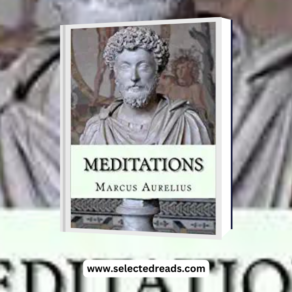“Meditations” by Marcus Aurelius, a renowned Roman Emperor and Stoic philosopher, is a collection of personal reflections and philosophical musings. Written as personal notes to himself, the work delves into themes of virtue, wisdom, mortality, self-reflection, and the nature of human life. It is not a singular narrative but rather a series of thoughts divided into twelve books.
Key themes and ideas include:
- Virtue: Aurelius repeatedly emphasizes the importance of living a virtuous life. He advocates for integrity, kindness, humility, and fortitude.
- Stoic Philosophy: Following the Stoic doctrine, Aurelius believes that we cannot control external events, only our responses to them. He advises acceptance and emotional resilience in the face of adversity.
- Mindfulness and Reflection: Aurelius promotes self-awareness, introspection, and mindfulness. He urges readers to examine their thoughts, behaviors, and desires critically.
- Mortality and Transience: The temporary nature of human life is a recurring theme. Aurelius contemplates death and the ephemeral nature of all things, urging readers to focus on the present and live fully and virtuously.
- Cosmopolitanism and Community: Aurelius sees humanity as a unified whole, emphasizing our shared moral duties. He promotes kindness, understanding, and mutual respect in our interactions with others.
- The Natural Order: A firm believer in the Stoic concept of “logos” (the divine rational principle governing the universe), Aurelius suggests that everything occurs according to a natural order. He recommends living in harmony with nature and accepting its course.
“Meditations” does not offer systematic arguments like a traditional philosophical text. Instead, it provides practical guidance, ethical maxims, and wisdom derived from Aurelius’ own experience and contemplation. It continues to be valued today for its timeless wisdom, serving as a guide to leading a thoughtful, meaningful, and virtuous life.
For a full summary of Meditations check out this post entitled Marcus Aurelius Summary.
Marcus Aurelius Meditations Quotes
Here are some of the best Marcus Aurelius Meditations quotes:
“If it is not right do not do it; if it is not true do not say it.” ― Marcus Aurelius, Meditations
“It is not death that a man should fear, but he should fear never beginning to live.” ― Marcus Aurelius, Meditations
“Everything we hear is an opinion, not a fact. Everything we see is a perspective, not the truth.” ― Marcus Aurelius , Meditations
“The object of life is not to be on the side of the majority, but to escape finding oneself in the ranks of the insane.” ― Marcus Aurelius, Meditations
“Perfection of character is this: to live each day as if it were your last, without frenzy, without apathy, without pretence.” ― Marcus Aurelius, Meditations
“You have power over your mind – not outside events. Realize this, and you will find strength.” ― Marcus Aurelius, Meditations
“If you are distressed by anything external, the pain is not due to the thing itself, but to your estimate of it; and this you have the power to revoke at any moment.” ― Marcus Aurelius, Meditations
“The first rule is to keep an untroubled spirit. The second is to look things in the face and know them for what they are.” ― Marcus Aurelius, Meditations
“The best revenge is not to be like your enemy.” ― Marcus Aurelius, Meditations
“If someone can prove me wrong and show me my mistake in any thought or action, I shall gladly change. I seek the truth, which never harmed anyone: the harm is to persist in one’s own self-deception and ignorance.” ― Marcus Aurelius, Meditations
“It is in your power to withdraw yourself whenever you desire. Perfect tranquility within consists in the good ordering of the mind, the realm of your own.” ― Marcus Aurelius, Meditations
“Dwell on the beauty of life. Watch the stars, and see yourself running with them.” ― Marcus Aurelius, Meditations
“If there are gods and they are just, then they will not care how devout you have been, but will welcome you based on the virtues you have lived by. If there are gods, but unjust, then you should not want to worship them. If there are no gods, then you will be gone, but will have lived a noble life that will live on in the memories of your loved ones.” ― Marcus Aurelius
“The things you think about determine the quality of your mind.” ― Marcus Aurelius, Meditations
“The first rule is to keep an untroubled spirit. The second is to look things in the face and know them for what they are.” ― Marcus Aurelius, Meditations
“Accept the things to which fate binds you, and love the people with whom fate brings you together,but do so with all your heart.” ― Marcus Aurelius, Meditations
Final thoughts
In summary, “Meditations” by Marcus Aurelius stands as a timeless treasure in philosophical literature, offering profound insights into Stoicism and the art of living. Through its collection of personal reflections and ethical exhortations, the work delves deep into the human condition, addressing themes like virtue, the acceptance of mortality, mindfulness, and the interconnectedness of humanity. Aurelius’ meditations serve as a practical guide to leading a life of integrity, resilience, and introspection.
The Stoic Emperor’s thoughts, encompassing the need for self-awareness, the acceptance of life’s transience, and the pursuit of a virtuous life in harmony with nature, resonate through the ages. His teachings, emphasizing control over one’s internal states rather than external events and the importance of living in accordance with nature’s order, are as relevant today as they were in ancient times. “Meditations” remains a profound source of wisdom, encouraging readers to ponder deeply on life, their place in the cosmos, and the virtues that make life meaningful and fulfilling.







